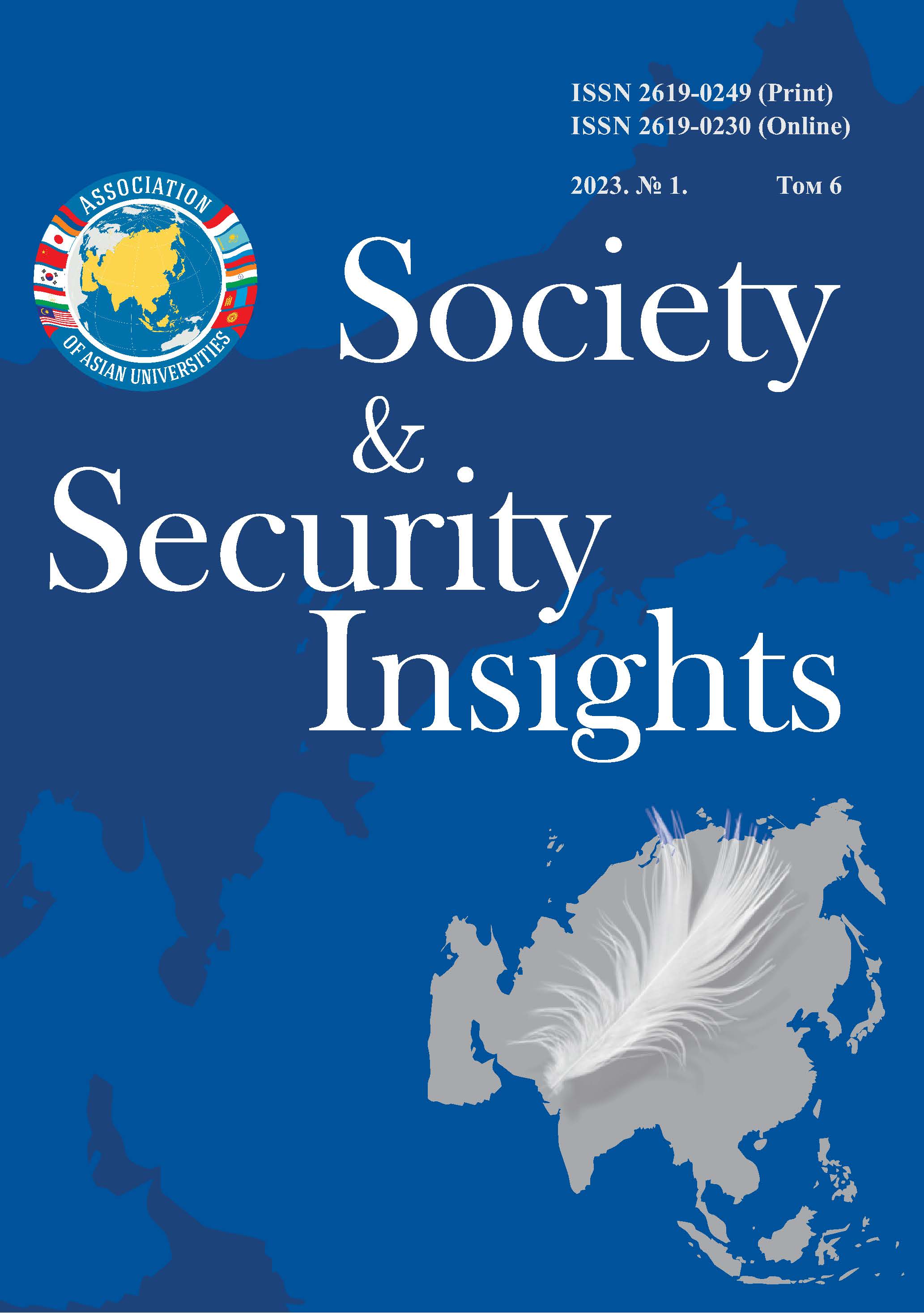THE «ZHOU YI» («BOOK OF CHANGES») IN THE SOCIAL AND CULTURAR CONTEX
Main Article Content
Abstract
The article deals with the tradition of classical Chinese text «The Book of Changes». The relevance of the work lies in the fact that the value of "Zhou Yi" has been thoroughly studied by Chinese scientists, but for readers who do not speak Chinese, many aspects of the unique classic book are little known. It is shown that the text of «Zhou Yi» is much more meaningful than combinations of hectograms. The authors of the article point out that "Zhou Yi" was used to discuss many cultural and legal issues. The "Book of Changes" contains entries about the problems of ordering property issues. Such discussion contributed not only to the settlement of property management issues, but also consolidated the ancient tradition of following the morality and virtue. The article presents that the sphere of marriage and the family relations, based on the engagement ceremony, formed the basis of the entire future marriage system of China for many generations. The authors show that a separate chapter "Zhou Yi" is devoted to the rules of inheritance. In this section of the "Book of Changes" inheritance in the male line becomes the fundamental principle in China. This article emphasizes that much attention in the "Book of Changes" is paid to the forms, types and methods of execution and punishment, as well as the system of evidence. The article provides an analysis of the social, cultural and legal ideas of «Zhou Yi», which determined the specifics of the Chinese legal system.
Downloads
Metrics
Article Details

This work is licensed under a Creative Commons Attribution 4.0 International License.
Authors retain the copyright of their manuscripts, and all Open Access articles are distributed under the terms of the Creative Commons Attribution License, which permits unrestricted use, distribution, and reproduction in any medium, provided that the original work is properly cited.
References
Капра Ф. Дао физики. Исследование параллелей между современной физикой и восточной философией. М.: МИФ, 2017. 317 с.
Кобзев А. И. Учение о символах и числах в китайской классической философии. М., 1994. 432 с.
Кучера С. И. «Гласные» и «негласные» законы Древнего Китая //Общество и государство в Китае. 2014. № 2. С. 40-113.
Мельникова Е. Г. Понятие рецепции: современные исследовательские подходы к анализу текстов культуры // Ярославский педагогический вестник. 2012. №3. С. 239-242.
Моисеева О. Г. Цели и виды наказаний в традиционном праве Китая //Известия Алтайского государственного университета. 2018. № 6. С. 42-46.
Фомюк Г. А, Кудина Е. А. Принцип нумерации гексаграмм в Книге Перемен. Киев: Орияны, 2006. 144 с.
Шашин З С. Представление о времени в книге перемен // Вестник ВятГУ. 2011. №4-1. С. 18-22.
Щанкина Л Н, Заиченко А. А. Имущественные отношения в Древнем Китае // Право, экономика и управление: от теории к практике: материалы Всеросс. науч.-практ. конф. с международным участием (Чебоксары, 21 мая 2020 г.). 2020. С. 41-45.
Hon Tze-Ki. Chinese Philosophy of Change (Yijing) /The Stanford Encyclopedia of Philosophy, Edward N. Zalta (ed.). URL: https://plato.stanford.edu/entries/chinese-change/ (дата обращения: 22.02.2023)
Huang S. Ten thousand businesses would thrive in a harmonious family: Chinese conflict resolution styles in cross-cultural families //Intercultural Communication Studies. 2000. Т. 9. №. 2. С. 129-144.
Tu W. Confucian thought: Selfhood as creative transformation. Albany, NY: State University of New York Press. 1986. 203 p.
杨婕.《周易》中的法律规则及其功能主义分析. 内蒙古大学, 2016. P. 25-26.
叶鹏煌.《周易》中的司法文化[J]. 现代哲学. 2013. No. 6. P. 7-10.
REFERENCES
Eremeev, V. E. (2005). Symbols and Numbers of the «Book of Changes». Moscow: Scientific publ. center «Ladomir». (In Russ.).
Symbols and Numbers of the «Book of Changes». Moscow: Scientific publ. center «Ladomir». (In Russ.).
Capra, F. (2017). Tao of Physics. An Exploration of the Parallels between Modern Physics and Eastern Philosophy. Moscow: MIF. (In Russ.)
Kobzev, A. I. (1994). The Doctrine of Symbols and Numbers in Chinese Classical Philosophy. М. (In Russ.).
Kuchera, S. I. (2014). Official and nonofficial laws of ancient China. Society and State in China, 2, 40-113. (In Russ.).
Melnikova, Е. G. (2012). The concept of reception: modern approaches to the analysis of cultural texts. Yaroslavl Pedagogical Bulletin, 3, 239–242. (In Russ.).
Moiseeva, O. G. (2018). Purposes and Тypes of Punishment in the Traditional Law of China. Izvestia of Altai State University, 6, 42–46. (In Russ.).
Fomuk G. A., Kudina E. A. (2006). The Principle of Numbering Hexagrams in the Book of Changes. Kyiv: Oriyany. (In Russ.).
Shashin, Z. S. (2011). Representation of time in the book of changes. Vestnik VyatGU, 4(1), 18–22. (In Russ.)
Shchankina, L. N., & Zaichenko, A. A. (2020). Property Relations in Ancient China. Law, Economics and Management: From Theory to Practice:Materials of the All-Russian. scientific-practical. conf. with international participation (Cheboksary, May 21, 2020, pp. 41–45). (In Russ.).
Hon, Tze-Ki. (n. a.) Chinese Philosophy of Change (Yijing) /The Stanford Encyclopedia of Philosophy, Edward N. Zalta (ed.). https://plato.stanford.edu/entries/chinese-change.
Huang, S. (2000). Ten thousand businesses would thrive in a harmonious family: Chinese conflict resolution styles in cross-cultural families. Intercultural Communication Studies, 9(2), 129-144.
Tu, W. (1986). Confucian thought: Selfhood as creative transformation. Albany, NY: State University of New York Press.
Yang, Jie. (2016). Analysis of Legal Rules and their Functionalism in "Zhouyi". Inner Mongolia University, 25-26. (In Chinese).
Ye, Penghuang. (2013). Judicial Culture in "Zhouyi". Modern Philosophy, 6, 7–12. (In Chinese).


 https://orcid.org/0000-0002-6481-4420
https://orcid.org/0000-0002-6481-4420